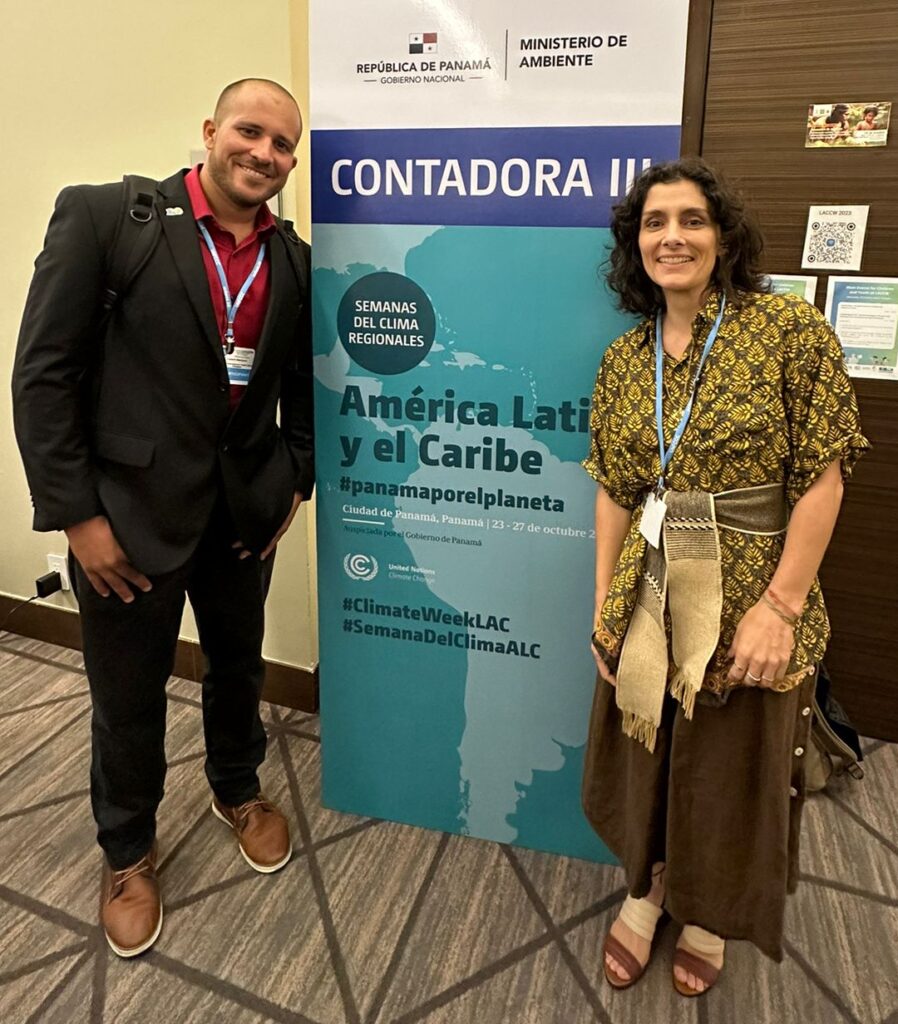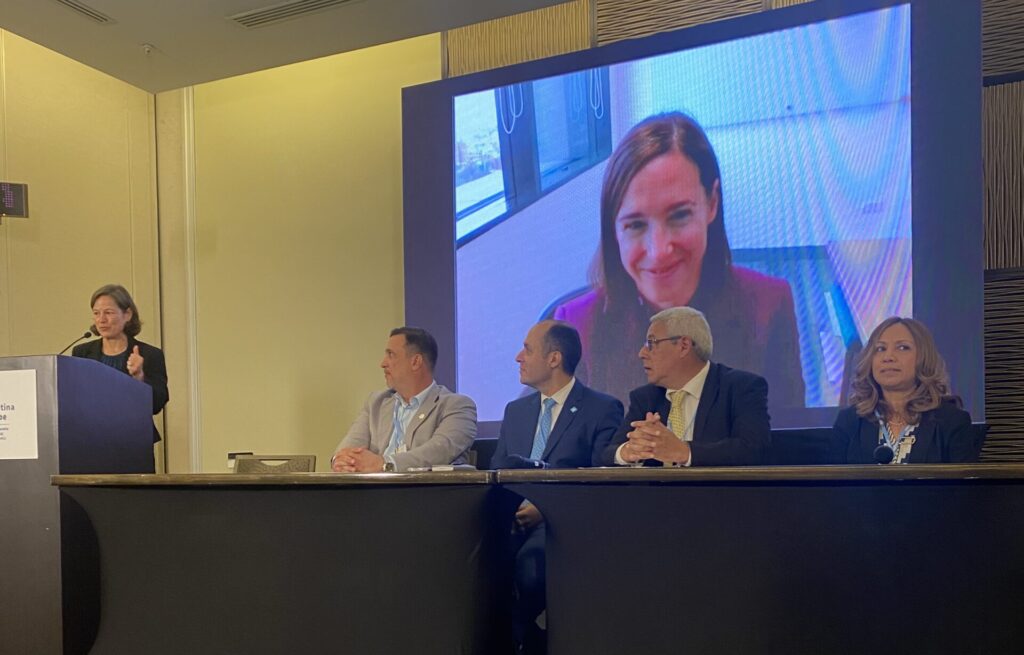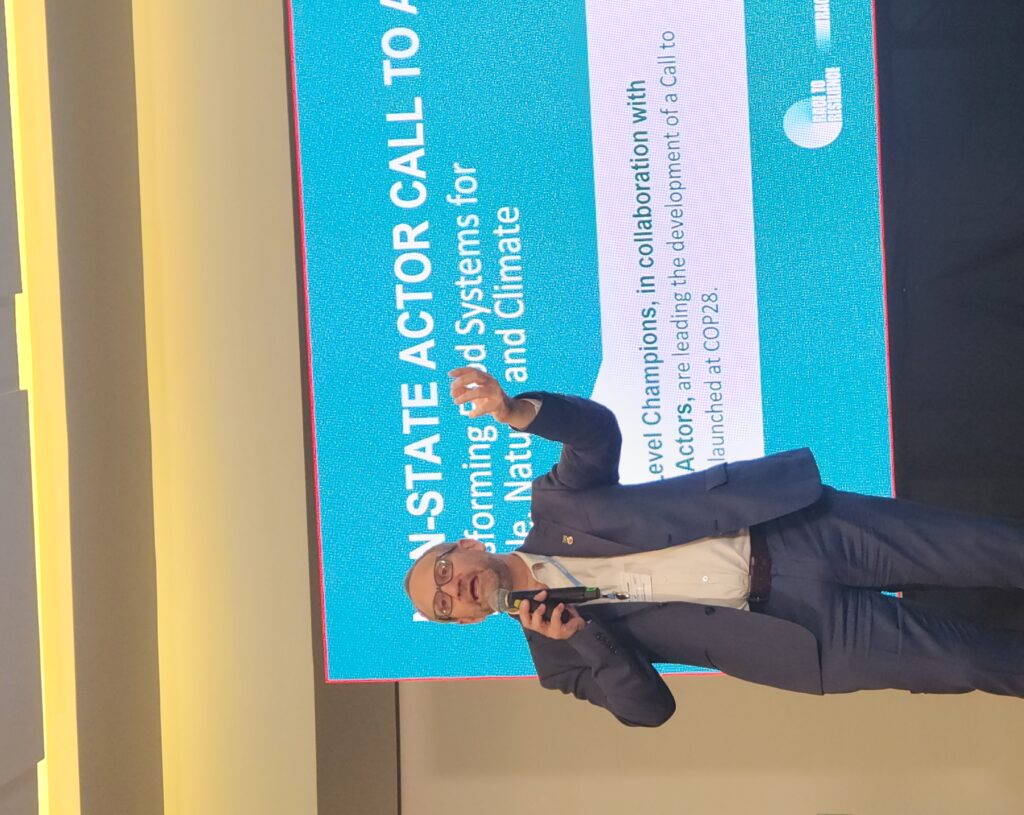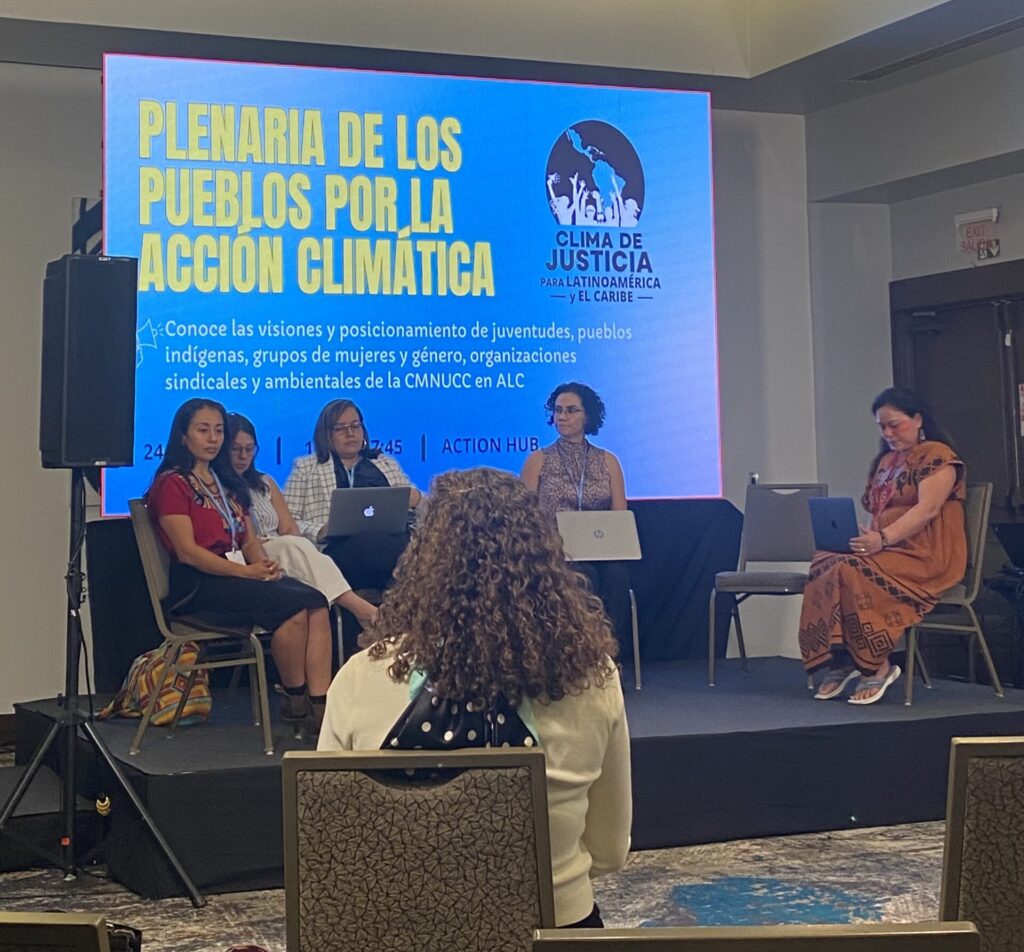LACCW Day 2: “Above all, do everything we can to protect nature. To do so means securing our own existence”
Day two of Latin America and Caribbean Climate Week 2023 saw delegates dive deep into a broad range topics, from the future of our planet’s threatened marine ecosystems to the potential of green shipping, the transformation of our food systems, and the invaluable role of Indigenous communities in climate dialogues.
By Climate Champions | October 25, 2023
Key takeaways:
- Oceans face imminent risk, with up to 90 percent of coral reefs in danger by 2050.
- Community-led ocean protection is crucial for conservation.
- If shipping is to reach net zero emissions by 2050, it requires mid-term measures.
- Climate impacts are evident; the Panama Canal has seen its freshwater levels diminish over the past nine years due to climate change.
- Addressing emissions, soil health, deforestation and food waste are key to fixing our food systems.
- COP28 will focus on a sustainable food system by 2030.
- Indigenous representation is critical in climate action.
- Equitable resource access for Indigenous communities is essential in climate financing.
- Indigenous wisdom offers solutions to modern climate challenges, bridging tradition and innovation.
- Gender equity, human rights, and climate action are intertwined.
- Critical regions like the Amazon demand protection, with Indigenous involvement being crucial.
Oceans: A global priority
The day began with an urgent focus on oceans. In an event hosted by Race to Resilience and its partners, the Global Fund for Coral Reefs (GFCR) and the Ocean Risk Alliance (ORRAA) – who are leading on the Coral Reef Breakthrough – experts highlighted the risk facing up to 90 percent of coral reefs by 2050. Christopher Corbin, Program Officer, Secretariat of the Cartagena Convention, set the tone of the session: “We need to stop doing the same thing again and again and getting nowhere. We need to start thinking outside of the box.”
He underlined the importance of acting urgently and accelerating climate action, in particular for Small Island Developing States (SIDs), prioritizing adaptation and resilience action for marine ecosystems and coastal communities in the region. Nara Vergas, Principal Executive of Technical Advisory on Biodiversity and Climate – Latin American Development Bank CAF, introduced CAF’s vision of a healthy ocean and blue economy in the region and presented their 10 lines of action to protect the oceans.
Oscar Orrego, from Action Fund, emphasized the importance of community-led ocean protection, stating:
When communities lead, we ensure success, considering the needs of women, children, Indigenous peoples, and local communities. We need collaboration between financial institutions, governments, and civil society.”
Mike Mitchell shared Acarí’s innovative and impactful solution for the invasive species of lionfish, creating new revenue streams for affected fishermen in Mexico and Colombia, and reducing the threat on Caribbean coral reefs.
Claudia Ruiz, MAR Fund, shared the world’s second parametric insurance to cover for hurricane risks, an innovative finance mechanism for the conservation of coral reefs in Mesoamerica Region – the biggest coral reef in the Atlantic Ocean, with economic benefits of over $ 4.5M USD/year. Ruiz reinforced the importance of building trust and capacity building within the local communities for those mechanisms to work.

Youth delegate Lázaro Márquez with Climate Champions’ LAC Director, Daniela Lerario.
Lastly, youth delegate Lázaro Márquez remarked:
We must set free the best of us, our optimism and hope. But above all, do everything we can to protect nature, which means securing our own existence.”
Future of green shipping
The future of green shipping was discussed in the session Raising Ambition on Green Shipping to achieve zero by 2050. Climate Champions’ Shipping Lead, Katharine Palmer, and Senior Director, Ocean and Climate, UN Foundation, Susan Ruffo launched the session, reinforcing the necessity of ambitious mid-term measures to reach the International Maritime Organization’s benchmarks while bolstering national and regional opportunities.

Future of green shipping panel.
Manager Policy and Environmental Assessment Panama Canal Authority, Angel Urena, revealed that the Panama Canal, a waterway using freshwater for its operations, had seen its freshwater levels diminish over the past nine years due to climate change, underscoring the urgent reality.
Ervin Vargas, from MTCC Latin America, insisted that nations have the technical capabilities to make informed decisions now rather than later. Maersk’s Danilo Veras captured the sentiment of the day, stating: “Decarbonizing shipping is not only a trend but a must,” while urging for a pricing mechanism to bridge the disparity between fossil and green fuels.
The discussions culminated in a call to arms, as participants underscored the role of public and private sectors alike in forging a greener, equitable shipping future. Urena said, “Net zero is a big achievement but it can be done.”
Food Systems: A Call to Action
In an urgent call to action leading up to COP28, UN Climate Change High-Level Champion for COP25 (HLC) for Chile, Gonzalo Muñoz underscored the profound connection between our food systems and individual wellbeing, stating:
We need to act locally and understand and resolve our relationship with food. We need to fix a vicious system, and this means correcting deforestation, food waste, emissions, and soil health.”

UN Climate Change High-Level Champion (HLC) for Chile, Gonzalo Muñoz
Muñoz, as Chair of the Non-State Actors Pillar of the COP28 Food Systems and Agriculture Agenda, announced a High-Level Champion initiative to seek input and eventual endorsement from all Non-State Actors (NSAs) on a Call to Action for Transforming Food Systems for People, Nature, and Climate.
The Call to Action will be launched at COP28, mobilizing collective effort from NSAs, and gathering around a shared vision of food systems that deliver significant, measurable progress for people, nature, and climate by 2030.
Encuentro de Saberes: Voices from Indigenous leaders
In the event, Encuentro de Saberes: Fortaleciendo nuestras raíces, accediendo al futuro (Meeting of Knowledge: Strengthening our roots, accessing the future), organized by the Pawanka Fund, Foro Indígena de Abya Yala (FIAY), and the Centro para la Autonomía y Desarrollo de los Pueblos Indígenas (Nicaragua), Indigenous leaders shared insightful perspectives on the intersection of traditional knowledge and climate change solutions.
Elders, despite unfamiliarity with modern climate terminologies, spoke of their deep connection to the land and how their traditional practices – from non-monetary exchange systems to preserving territorial integrity – offer resilient solutions to the climate crisis. The event underscored the disparity in climate finance, noting that just 1 percent reaches these communities. Calls were made for a larger allocation from the Green Climate Fund, emphasizing direct dialogue and a closer collaboration between global entities and Indigenous peoples to better protect the environment and uphold their heritage.
Collective voices for change
Youth voices in a Peoples’ Plenary echoed the sentiment that the climate crisis perpetuates social injustices “generated by countries that prospered through the extractive model in the Global South.” They emphasized the urgency for collective political responses that don’t just cater to individual regional needs but understand the unique context of each. Their rallying call was evident: “History is ours, and it’s its people and youth who make it.” They called for increased transparency in financial systems to ensure funds genuinely reach those most vulnerable.
Women & Gender constituencies underscored the compounded effects of the climate crisis on social and economic inequalities, especially for marginalized groups like trans people and those outside gender norms. Their message was clear: climate solutions need to honour human rights and ensure justice: “There will be no climate justice without human rights.”
 Trade Union Non-Government Organizations (TUNGOs) emphasized the inextricable link between environmental and labour struggles. Drawing attention to the implications of “false solutions and undemocratic approaches that jeopardize historic achievements of unions to date”, they championed the need for a sustainable development model that offers robust social dialogues.
Trade Union Non-Government Organizations (TUNGOs) emphasized the inextricable link between environmental and labour struggles. Drawing attention to the implications of “false solutions and undemocratic approaches that jeopardize historic achievements of unions to date”, they championed the need for a sustainable development model that offers robust social dialogues.
Environmental non-governmental organization (ENGOs) spoke of the essential transformations required in our consumption and production systems, pointing out not just the Global North’s historic responsibilities but also the responsibilities our governments have. The focus was clear – to move away from fossil fuels and prioritize ecosystem protection.
Indigenous groups shed light on the need to recognize and safeguard their rights, emphasizing the urgency as the Amazon reaches a tipping point. Their rich knowledge offers conservation practices and strategies that can guide climate actions, it was noted.
Innovation driving resilience
Finally, an Action Hub session on innovation and entrepreneurship for climate adaptation and resilience, highlighted the fundamental role of innovation as a driving force for climate action in Latin America and the Caribbean. Technology, entrepreneurial spirit, and an inclusive approach, it was agreed, are essential ingredients to strengthen and advance the agenda of adaptation and resilience in the region. During this session, Race to Resilience partners took centre stage in this conversation, sharing their work accelerating resilience building, financial flows and technology transfer to support emerging solutions.





 Trade Union Non-Government Organizations (TUNGOs) emphasized the inextricable link between environmental and labour struggles. Drawing attention to the implications of “false solutions and undemocratic approaches that jeopardize historic achievements of unions to date”, they championed the need for a sustainable development model that offers robust social dialogues.
Trade Union Non-Government Organizations (TUNGOs) emphasized the inextricable link between environmental and labour struggles. Drawing attention to the implications of “false solutions and undemocratic approaches that jeopardize historic achievements of unions to date”, they championed the need for a sustainable development model that offers robust social dialogues.